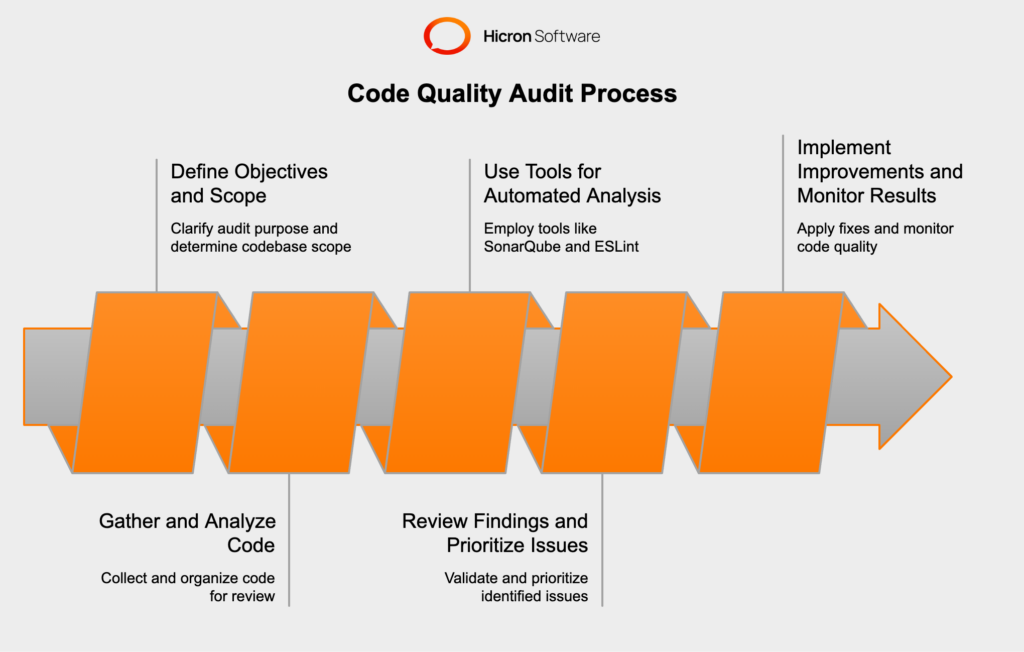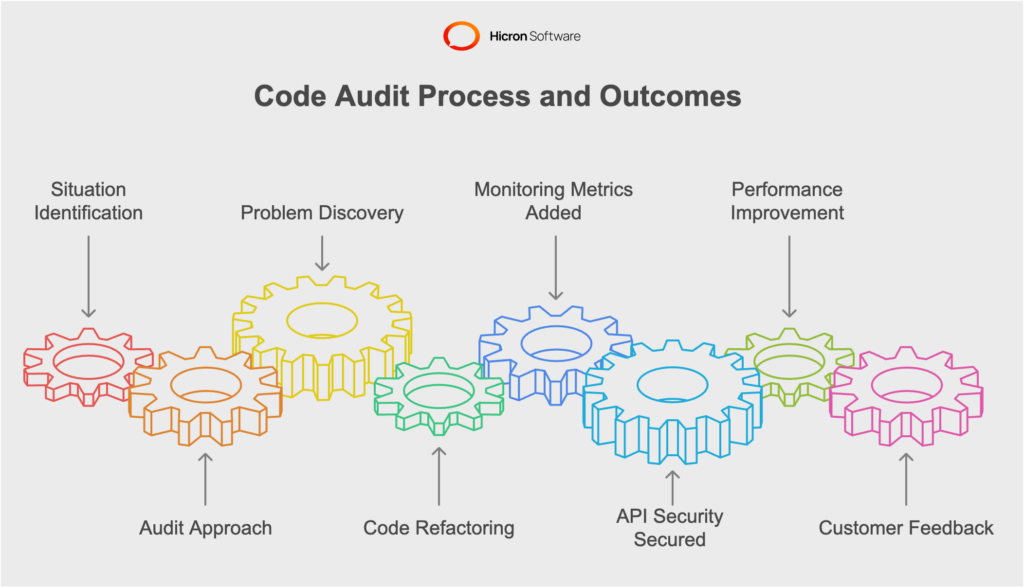An Introduction to Software Testing Life Cycle (STLC)
- March 22
- 8 min

A comprehensive software code audit and software quality assurance process ensures your product is both efficient and secure. A code quality audit is a thorough evaluation of software to ensure it adheres to established quality standards and best practices. This process examines key areas of the software development lifecycle, including design, coding, testing, and deployment, to identify potential risks, gaps, or deviations from industry standards or organizational policies.
The primary goals of a software quality audit include:
Code quality audits can be conducted internally by the organization or externally by third-party experts, and they often focus on areas like code quality, documentation, testing procedures, security, and user experience.
But what exactly makes code audits indispensable? Let’s dig deeper into how they align with the pillars of software quality assurance.
Software bugs are inevitable, but letting them linger can worsen over time. Code quality audits serve as proactive bug-hunting missions that pinpoint flaws early on, whether it’s a calculation error in financial software or a logic gap in an application workflow. By addressing issues at their root, you avoid costly troubleshooting down the line.
For instance, during a compliance audit, a healthcare application identified a bug in its data encryption method—an issue that could have violated HIPAA laws and led to fines. The early detection through the code quality audit allowed the team to resolve it efficiently, avoiding penalties and safeguarding customer trust.
Efficiency isn’t just about speed—it’s about building software that runs smoothly while using minimal resources. Code quality audits evaluate redundancy and poorly written components, helping teams restructure code to improve performance and scalability.
Imagine a logistics company whose platform processes real-time inventory updates. After a code quality audit, they reduced database query times by redesigning how searches were structured, leading to faster data retrieval and a better user experience.
From GDPR and HIPAA to ISO certifications, compliance audits are essential in demonstrating your organization’s commitment to secure and ethical software practices. Code quality audits help you identify vulnerabilities that threaten compliance and ensure your system aligns with global standards.
For example, a payment processing app leveraged a routine code efficiency audit to uncover and address gaps in its encryption protocols, preventing potential breaches that would have violated PCI DSS rules.
Cybersecurity is a growing concern, with software vulnerabilities often serving as entry points for attackers. Regular audits help close these gaps by identifying thinly veiled backdoors, outdated libraries, or incorrect access controls.
A popular e-commerce platform once discovered, through a security audit, that its API endpoint exposed sensitive customer information. By correcting the vulnerability, they avoided data exposure and maintained their loyal customer base.
Technical debt arises when developers prioritize speed over thoroughness, leaving behind sub-optimal solutions. While common in software development, unchecked debt can cripple an application’s performance in the long run.
Enter code quality audits. These structured reviews analyze existing code to identify where technical debt has accumulated, offering actionable insights to refactor and optimize the codebase. Over time, this reduces future costs and prevents architectural bottlenecks.
Regular engagement with code audits establishes a culture where teams review their work critically and consistently. Audits encourage developers to take pride in their craft, adopt best coding practices, and stay updated on the latest industry trends—whether that pertains to agile development or cybersecurity enhancements.
Teams that incorporate this approach often report higher efficiency, lower stress, and greater job satisfaction.
Conducting a code quality audit is a structured process that ensures software meets predefined quality standards.

Follow these five steps to execute a comprehensive audit effectively:
Start by clarifying the purpose of your audit. Are you aiming to enhance compliance, optimize code efficiency, or reduce technical debt? Identifying your objectives will help focus your efforts. Next, define the scope of the audit by determining which parts of the codebase to review. This can range from a specific component to the entire application, depending on your goals.
Once the scope is defined, collect the relevant code. Ensure you have access to all parts of the codebase included in the audit. Organize the code files and prepare them for review. Analyzing the structure and organization of the code helps identify obvious issues, such as inconsistent naming conventions or lack of documentation, early in the process.
Use modern tools to automate and streamline the audit process. Static code analyzers are invaluable for detecting errors, vulnerabilities, and code smells. Popular tools like SonarQube, ESLint, and Checkmarx offer in-depth insights into code quality and security. For instance:
After gathering results from the tools, review the findings manually to validate their accuracy. Not all issues flagged by tools are critical, so it’s important to prioritize them based on severity and impact. Focus first on high-risk areas, like security vulnerabilities or performance bottlenecks, then move on to less critical issues like aesthetic inconsistencies.
With a prioritized list of issues, plan and implement the necessary improvements, ensuring the changes align with your project’s objectives. After applying fixes, run additional audits to verify that the updates resolved the issues. Monitoring over time is crucial to maintaining and evolving the quality standards of your codebase.
To enhance your audit process, consider the following tools and frameworks widely used in the industry:
Each tool comes with unique strengths, so choose one based on your project’s programming language, scale, and specific needs.
| SonarQube |
|
|
| ESLint |
|
|
| Checkmarx |
|
|
| Coverity |
|
|
| StyleCop |
|
|
Remember, regular audits lead to more dependable software and better development processes, helping set the stage for long-term win.
To truly appreciate the importance of code audits, consider this case study:

This illustrates the multi-faceted nature of audits—bolstering performance and steering long-term success.
1. Mismatched Compliance Requirements
One of the biggest obstacles in software quality audits arises when internal processes do not align with industry regulations or standards like GDPR, HIPAA, or PCI DSS. This can leave vulnerabilities that lead to fines or security breaches.
Solution:
2. Technical Debt
Rushing software development leads to technical debt, where shortcuts impact long-term code quality. Unchecked, this can create bottlenecks in scalability and performance.
Solution:
3. Security Vulnerabilities
Weak security practices can introduce exploitable vulnerabilities, putting applications and user data at risk. This is especially critical for industries such as finance and healthcare.
Solution:
4. Resistance to Change
Teams may resist changes recommended by audits, particularly if they’re under tight deadlines or accustomed to long-standing practices.
Solution:
5. Insufficient Documentation
Poorly documented code makes it harder for audits to assess risks and trace issues back to their source.
Solution:
Here’s how you can leverage code audits to achieve lasting success:
Remember, the earlier you prioritize audits, the more resilient and scalable your software becomes. Make regular code audits part of your growth strategy.
Never underestimate the value of a well-executed audit. It’s more than a review—it’s a guarantee for better performance, stronger security, and seamless compliance. By adopting regular code audits, you’re not only enhancing your software’s immediate quality but also future-proofing it against unforeseen challenges. Investing in regular software quality audits builds not just a better codebase but also fosters trust among stakeholders.
Looking to enhance your software’s reliability? Explore our Code Audit Services for end-to-end solutions. Contact us today to incorporate expert code audits into your development process!
A software code audit is a thorough evaluation of your application’s code to ensure it adheres to quality standards and best practices. It helps identify inefficiencies, bugs, security loopholes, and areas for improvement in coding practices.
Software quality assurance ensures your applications meet regulatory standards, run efficiently, and remain secure. It helps prevent costly errors by catching issues early, enhances customer trust, and future-proofs your software.
Identifies hidden bugs and inefficiencies.
Enhances application performance and scalability.
Ensures compliance with industry standards (e.g., GDPR, HIPAA).
Strengthens security against vulnerabilities.
Reduces technical debt for cost-effective software management.
The audit process generally includes defining objectives, gathering and analyzing code, using automated tools for review, prioritizing identified issues, and implementing improvements. It focuses on compliance, performance, and security.
Common tools include:
SonarQube for code quality and security analysis.
Checkmarx for identifying vulnerabilities at development stages.
ESLint for JavaScript-focused coding checks.
Audits can be conducted internally by your development team or externally by third-party experts. External audits are often preferred for unbiased evaluations.
Code audits identify gaps in your software that could lead to non-compliance with regulations such as GDPR, HIPAA, or PCI DSS. They ensure your code adheres to these standards, mitigating risks and penalties.
Industries like healthcare, finance, retail, and technology rely heavily on code audits to ensure performance, customer data security, and regulatory compliance.
Code audits should be conducted periodically, especially after major updates, before deploying applications, or when scaling software to meet new business demands. Regular audits are key to maintaining long-term quality.
Yes, code audits help identify inefficient or outdated areas in your code that create technical debt. Resolving these issues early helps improve long-term maintainability and saves costs in future development cycles.
